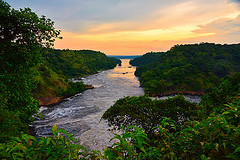Submitted by Administrator on Thu, 05/03/2015 - 12:56
New research published in Food Policy examines the complex interactions, dependencies and constraints of physical resources in Uganda, as a case study of Sub-Saharan Africa. The team based in the Centre for Sustainable Development, Department of Engineering (Cambridge), uses calorific demand analysis, and source-to-service transformation modelling visualised by Sankey diagrams, to show the extent of the food security challenge. Food demands in Uganda, already insufficiently met in the base year of 2012, are predicted to increase three or four-fold by 2050 as a result of population growth and economic development. The resource use implications of such projections, and interactions between them, show some critical issues in the water–land–energy–nutrients (WLEN) nexus.
Key ecosystem services are likely to be impacted by appropriation of natural grasslands for agriculture, water for irrigation, and energy for distributing that water demand (100 km3 annually), fertilizer inputs (1.2 billion tonnes annually), farm mechanisation and food distribution. A particular challenge for making the energy supply more sustainable is to attain much more efficiency out of biomass burning and reduce its massive environmental footprint, whilst for water, current policies and proposals for hydropower need to be adapted into multipurpose schemes optimised for irrigation.


